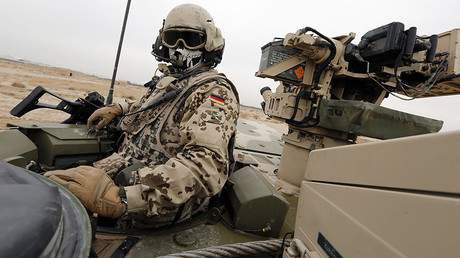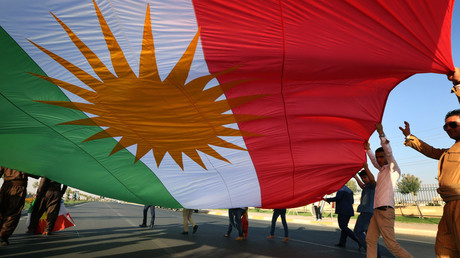‘We advance our interests by breaking international law’ – Left-wing German lawmaker
The defense policies of Germany and some other Western countries is a misleading concept: we don’t defend ourselves, we advance our interests using military force to the point of breaking international law, Left Party lawmaker Alexander Neu told RT.
Neu, the Left Party (Die Linke) spokesperson in the Bundestag Defense Committee, also discussed the crisis in eastern Ukraine, the Syrian conflict, and Washington’s decision to impose sanctions on Russia, as well as Germany’s new foreign policy strategy.
RT: Alexander Neu, you are a member of the Left Party and their spokesman on the Defense Committee. Parliamentary elections will take place in two weeks. Can the Left Party hold on to its positions in parliament?
Alexander Neu: I hope we strengthen our positions. Currently, we have 64 seats in parliament, which is 8.6 percent. I hope that after these elections we’ll have 10-11 percent. This would send the right message to the people.
RT: There have been quite a few developments in foreign policy and security policy over the last four years. I remember the 2013 campaign, when relations with Russia were more or less OK and the Syrian crisis was still in its early stages. What do you think has happened with security policy over the past four years?
AN: Yes, the Syrian crisis has escalated greatly in recent years. It seems, though, that we are pulling into the home stretch with this matter. It looks like Islamic State (IS, formerly ISIS\ISIL) will soon be defeated. Once this happens, Russia and Western nations will have to divide Syria into their respective zones of influence. That’s number one.
Number two, Ukraine. The Ukraine conflict started in November 2013 and reached its peak in the spring of 2014. This conflict remains unresolved; it is still boiling and may become another “frozen conflict.” At the same time, the situation in Germany is changing: the military has adopted a new policy, boosting the number of personnel, building up the number of troops, the amount of weapons, financial resources. Germany wants its share of the pie. It wants to increase its influence, and this includes projecting its military power.
RT: What do you think about this parliament’s defense policies, what it has done in matters of war and peace?
AN: The last four years were extremely disturbing. We made little progress in the matter of our peaceful policies. On the contrary, if you look at our tensions with Russia in late 2013 – early 2014, which started with the riots on Maidan and the Nazi coup in February 2014 — the West admired those Nazis and did not view them as such — even some members of the Green Party did not see them for what they really were — and then there was Crimea’s reunification with Russia and simultaneously the escalation of the Syrian war, which is still going on. But we are pulling into the home stretch. The Islamic State (a terrorist organization banned in the Russian Federation) will soon be defeated. But then there will be the issue of the zones of influence. The West has ground troops in Syria; Russia, too, has ground troops in Syria, and I don’t expect the West to give up the territories it controls easily and respect Syria’s sovereignty. As for the military, we have seen a new trend. Defense Minister Ursula von der Leyen plans to abandon the disarmament programme in a year and start building up personnel and financial resources, as well as heavy weapons. Her goal is to secure 130 billion euros over the next 13 years to purchase heavy weapons. They think they need a stronger military to play a bigger role in international affairs, including militarily.
RT: There was a document in the circles close to the federal government in early 2014 speaking of “new responsibility.” What do you think is the federal government’s idea of the “new responsibility” in terms of foreign and defense policies? What does this term mean?
AN: Actually, it was not “in the circles close to the federal government” that this document emerged; it was produced by the Foundation for Political Science and Politics together with the Marshall Fund. There were politicians, researchers, diplomats and businessmen involved in working on this document. It is like a vision for Germany’s foreign policy strategy. Germany wants to become a key player in international affairs. This document is a kind of a roadmap showing how to achieve this goal. For example, the authors believe that the United States will be less active in Europe going forward. This affords an opportunity for Germany to fill this void, replacing the United States.
RT: So, as far as defense policy is concerned, this document was the first step towards building up the military. At the same time, the federal government is working through diplomatic channels to help resolve the Syrian and Ukrainian crises, always ruling out the possibility of direct military involvement. This is a positive development, right?
AN: There are some distinctions here. In Syria, we have a military presence: we have our Tornado reconnaissance jets there, refueling aircraft, and a navy vessel. This means that we are using military instruments in addition to diplomacy. This violates international law because the Syrian government has not asked for our assistance to fight ISIS. Germany is also involved in the Ukraine crisis. This is a somewhat weird situation. The West poses as an arbitrator, only this arbitrator sides with Ukraine and wants to punish Russia. Basically, this shows how much the European Union and NATO, or countries like Germany, Britain and the United States, are heavily involved in this conflict. They are at least parties to this conflict between Ukraine and Russia. The West and Russia are engaged in a standoff over Ukraine, seeking to influence it.
RT: The Left Party has consistently opposed war. At the same time, when the civil war in Syria escalated, many left-leaning people who are not members of the Left Party went to northern Syria to support the Kurds. Isn’t this a contradiction? What does the Left Party think about this situation?
AN: We discussed it within the faction, and it was a heated debate. This is the situation we are facing: Pacifists cannot condone the use of force, but anti-militarists (and it is an important distinction) recognize the right to self-defense. I don’t think we can tell people, “You have to figure it out somehow. ISIS is at the gate, you might die, but it is not our problem, because we are pacifists.” I do not accept this reasoning. I have never been a pacifist, I am an anti-militarist. It means that in my opinion military force should be our last resort, we have our natural right to self-defense that cannot be taken away. But we should not abuse the idea of defense and self-defense. So, the defense policy of Germany and Western countries is a misleading concept: we don’t defend ourselves, we advance our interests using military force to the point of breaking international law.
RT: So if I got it right, you think that the Kurdish people living in northern Syria have the right to defend themselves. Americans and other members of the coalition support Kurdish groups in this conflict, but the Kurds don’t just fight against ISIS, they also target government forces. What do you make of this?
AN: It really is a complicated issue. The Kurdish self-defense efforts in northern Syria and the blockade of ISIS forces were absolutely legitimate. What choice did they have? But now Kurds living in these territories are seeking some sort of independence. Reports about their fight for independence from Syria are often refuted, but I do know that they are manipulated by the Americans. They get American weapons and serve as their boots on the ground fighting against ISIS. So it is very unlikely that they will be willing to give up control over the territories. We see the same happening in northern Iraq, and soon we even expect a referendum on Kurdish independence. I cannot approve of that move. I strongly oppose separatism. My standard is international law, and I know that any separatist movement creates more problems than solutions. Look at Sudan (Sudan and South Sudan). None of their problems were solved, on the contrary – things got even worse. Or the former Yugoslavia. The situation did not improve, because now we have seven tiny states, one of which is on the verge of failing. Whenever there is a split, there are no solutions, things only get worse, and the original conflict is dragged out.
RT: So, you think that a united Syrian state and strong government will provide the solution to the current crisis?
AN: Certainly! We have witnessed the fragmentation of Libya and know what it entails.
RT: As you’ve just mentioned, the Federal Government of Germany hasn’t contributed enough to the de-escalation and resolution of conflicts in Ukraine and Syria. There’s one more pressing issue – Iran nuclear talks which started during Obama’s last term. Frank-Walter Steinmeier, the foreign minister at the time, and Sigmar Gabriel, the economics minister, were actively promoting the +1 talks and insisted that a diplomatic solution to the Iran nuclear problem should be found. Could you name at least one initiative that the Left Party supports?
AN: Yes, this deal is a great achievement. We see that we avoided a war, but we also see that the achievements of this deal are in jeopardy. The US has not lifted quite a number of the imposed sanctions, but has imposed new ones under various pretexts. It seems that America under Trump is not interested in trying to make this deal work and impose new sanctions to provoke Iran to break it. But if Iran acts wisely, it will not be provoked and the US will not find a pretext to start a war, which, I think, America would be happy to do.
RT: As for the sanctions, the US Congress and President Trump imposed a new set of sanctions against Russia, and some of them could even affect European companies. The Federal government and the Chancellor protested against that. What is the purpose of sanctions against Russia and against the energy sector?
AN: It’s true, when Washington and Brussels (I mean, European countries) play the sanctions game, they usually coordinate these decisions. I do not support sanctions because they usually affect ordinary people. Also, the anti-Russia sanctions are not legitimized. When the US imposed this last set of sanctions they did this unilaterally without discussing it with their European partners, thus offending them. The European countries are not too happy about it. The Federal Government of Germany is worried the sanctions may affect the ongoing projects, mainly the Baltic Sea pipeline and the North Sea pipeline. It seems that political and economic interests are involved here. They want to supply North American liquefied shale gas to Europe and to oust Russia from the European gas market. It’s interesting how the situation in the US is developing: initially Trump positioned himself as a tough and active person in various fields, including foreign policy, but he has been sidelined by the Democrats and by his own party members. Now we see that he no longer controls the affairs relating to Russia. As for the new set of sanctions, he signed the Russia sanctions bill, but he is not able to call them off – this is up to Congress. We see that he delegated most foreign policy affairs to Congress, and became a lame duck president regarding Russia.






0 Comments:
Post a Comment
Subscribe to Post Comments [Atom]
<< Home